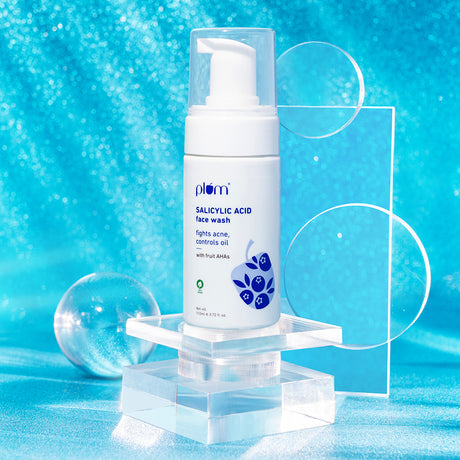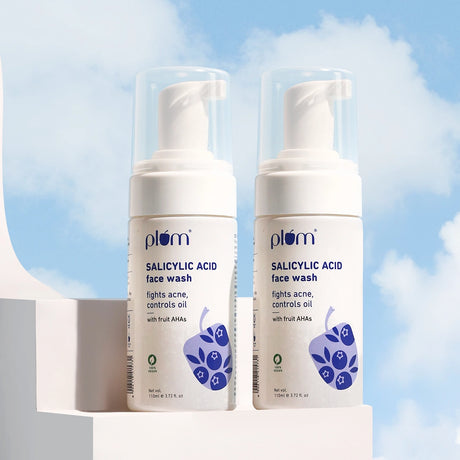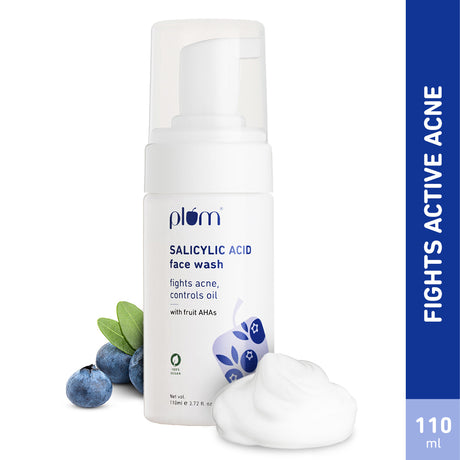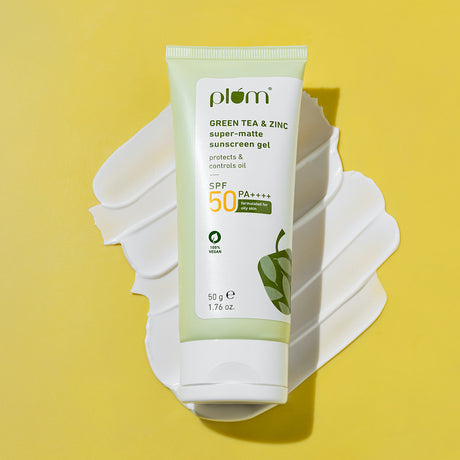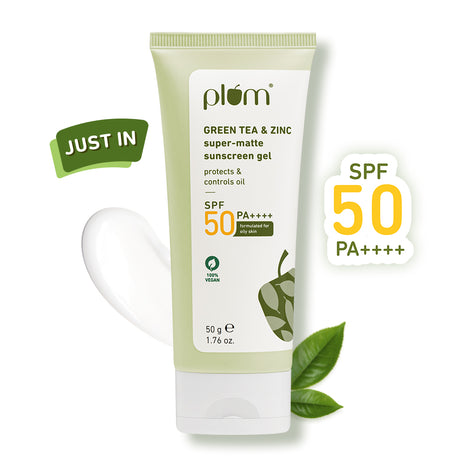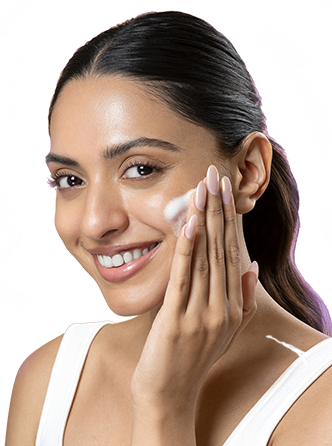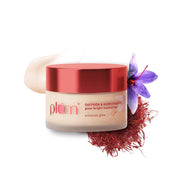
IN THIS ARTICLE
The first step towards the journey to healthy and beautiful skin is understanding your skin type.
Without this knowledge, you could end up following the wrong routine while using products that don't suit your skin, potentially causing more harm than good.
While everyone needs a CTMS (cleansing-toning-moisturizing-protecting) routine, knowing your skin type would further help you build a dedicated routine and identify suitable ingredients and formulations.
So, if you have ever wondered how to identify your skin type, here is a detailed blog to guide you through.
Why do you need to know your skin type?
Knowing your skin type is the cornerstone of your skincare routine which can help in the following ways:
- Customized skincare routine: It is easier to choose products and build a skincare routine that addresses your specific needs when you know your skin type.
- Preventing irritation: By knowing your skin type, you can avoid products that can possibly cause irritation, breakouts, or dryness. For example, if you are aware of having oily skin, you can avoid comedogenic products and stick to oil-free formulas.
- Better skin health: Following a customized skincare routine suitable for your skin type will help promote overall skin health, leading to a clearer, more radiant complexion.
What are the types of skin?
The following are the 5 major types of skin and their characteristics :
- Oily skin: Identified by a shiny appearance, enlarged pores, and prone to acne and blackheads.
- Dry skin: Tends to get dry and flaky easily, has a rough texture, and might feel tight or itchy.
- Combination skin: Difficult to identify and manage. It is characterized by excess oil secretion in the T-zone (forehead, nose, chin) with dry or normal in other areas.
- Normal skin: The best of all, it is balanced, not too oily or dry, with smooth skin texture.
- Sensitive skin: Gets easily irritated, and prone to redness, burning, or itching.
How to determine your skin type

There are two simple methods to identify your skin type
A. The bare-faced method
- Cleanse your face with a mild cleanser like the Green Tea Pore Cleansing Face Wash
- Pat dry and do not apply any products for about an hour.
- Observe closely how your skin feels and looks after a while.
Analysis
- If your skin feels itchy and flaky, you have dry skin. If it has a shiny appearance with oil on your face, it's oily.
- If you have oil on the t-zone and dryness on the cheeks, it's a combination.
- If your skin feels inflamed or itchy, you have sensitive skin.
- Lastly and fortunately, if you feel none of the above and your skin feels at ease, you have normal skin.
Please note that dry skin is not the same as dehydrated skin. Dehydrated skin is a lack of water that can occur in any skin type.
B. The blotting sheet test
- Gently press a blotting sheet on different areas of your face (forehead, nose, chin, cheeks).
- Hold the sheet up to the light to see the oil content on your skin around midday or evening.
Analysis
- If the sheet is saturated with oil and feels sticky, you have oily skin.
- If the sheet reveals oil from the T zone and little or no oil from the cheeks, you have combination skin.
- Similarly, a completely dry and negligible oil on the sheet from your entire face means you have dry skin.
- Minimal oil on sheets means normal skin.
- Lastly, if your skin feels inflamed or sensitive, you have sensitive skin.
While these are the at-home steps for identifying your skin type, you can also opt for professional Consultation. Consult a dermatologist to get an in-depth and precise assessment of your skin type.
Skincare routine for each type of skin
Oily skin
A rather challenging skin type to manage, ensure that you cleanse and moisturize your skin twice a day.
Look for gentle foaming face wash like the 1% Encapsulated Salicylic Acid Foaming Face Wash and Green tea face wash and specialized moisturizers for oily skin that are lightweight and oil-free.
Opt for alcohol-free toners and serums with actives like niacinamide, salicylic acid, and green tea to balance sebum production and control excessive shine.
Ensure to use a non-sticky sunscreen like the 2% Niacinamide & Rice Water SPF 50 PA+++ Hybrid Sunscreen every day in your morning routine.
Dry skin
To ensure your skin stays healthy, opt for nourishing and moisturizing ingredients and products in your routine.
Choose from dry skin moisturizers and cleansers that are enriched with hydrating ingredients like hyaluronic acid, ceramide, niacinamide, vitamin E, papaya, oat, etc.
While following the dry skin regimen, look for rich creamy products that hydrate your skin from within and do not strip off the natural oils from your skin.
Niacinamide, vitamin C, and hyaluronic acid serums are your best bets for nourished, glowing skin.
Combination skin
Use a balanced cleanser for combination skin that suits both oily and dry areas.
Carefully pick products like face wash and moisturizers that cater to the specific area of your skin, like mattifying products on the T-zone, and hydrating products on dry areas.
Look for niacinamide or green tea toners and salicylic acid, niacinamide, vitamin C or retinol for serums.
Normal skin
The best of all skin types, normal skin just requires a dedicated routine that includes a gentle cleanser, hydrating toner and serum, and a light moisturizer.
Apply sunscreen daily to protect your skin from UV damage with a broad-spectrum SPF.
Sensitive skin
For sensitive skin, choose products free from irritants and harsh formulations.
Look for products with soothing ingredients like aloe vera, oat, hyaluronic acid, and chamomile, and always test new products on a small area before applying them to your face.
Common mistakes to avoid while following your skincare routine
1. Ignoring seasonal changes
Your skin’s needs can change with the season, requiring hydrating in winter to oil-free formulations in summer, etc. Adjust your skincare routine accordingly to address these changes.
2. Using the wrong products
Using products not suited for your skin type can exacerbate existing issues and cause new problems. Always choose products designed for your skin type.
3. Overdoing skincare
While a 10-step, 15-step skincare routine is a trend, using too many products can overwhelm your skin, leading to irritation and breakouts.
Stick to a simple, effective routine that suits your skin type. Remember that your skin is different from your girl gang and their routine might never suit your skin.
Determining your skin type can be a game changer for your skincare routine.
By understanding your skin’s unique needs, you can choose the right products and routines to address those needs effectively.
Use these methods to check your skin type and choose a suitable routine and products for healthy skin today!
FAQs
Q.1. How can I identify my skin type?
Use the bare-faced method or the blotting sheet test to observe how your skin behaves. You can also consult a dermatologist for a professional assessment.
Q.2. What's the most common skin type?
Combination skin is the most common, characterized by an oily T-zone and normal or dry areas on the cheeks.
Q.3. What does oily skin feel like?
Oily skin often feels greasy and shiny, particularly in the T-zone. It is prone to breakouts and has larger, more visible pores.
Q.4. What does dry skin feel like?
Dry skin feels tight, and rough, and may appear flaky. It can also be prone to irritation and redness.
Q.5. What does sensitive skin feel like?
Sensitive skin tends to get irritated easily with new products and environmental factors, often feeling itchy, red, or burning. They often tend to get dark spots and acne more frequently than other skin types with the use of the wrong products.
How do I know what suits my skin?
First, ensure that you correctly identify your skin type which will help you choose suitable ingredients and products. Always patch-test new products and look for formulations designed for your specific skin type. Moreover, if you observe any irritation of sensitivity with a new product, immediately stop using the product.











